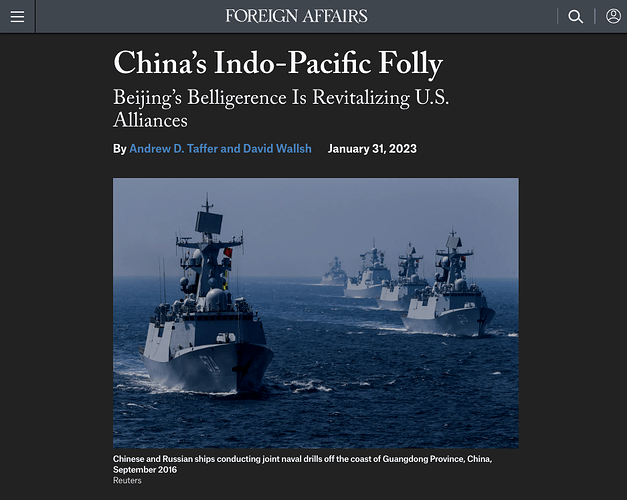-
日本时隔10年时间首次发布新的国家安全战略,承诺加强美日联盟。
-
整个印太地区的其他美国盟友加深了与华盛顿的伙伴关系,并相互形成了新的网络。
-
尽管中国国家主席习近平希望美国退出印太地区,而且他们长期以来对美国的联盟怀有敌意,但北京削弱美国联盟的努力是不连贯和无纪律的,加强了美国在该地区的联盟关系。
-
中国将华盛顿孤立于其亚洲盟友的野心被其收回失地和惩罚冒犯其情感的国家的欲望所破坏。
-
这些冲动导致了重大的战略错误,并表明北京并不像许多人认为的那样善于长期战略。
-
中国在南中国海和尖阁群岛追求领土优势,削弱了其削弱美国联盟的努力。
-
2016年,罗德里戈-杜特尔特(Rodrigo Duterte)当选为菲律宾总统,给了北京一个挑剔美国长期盟友的最佳机会。中国减少了与菲律宾的贸易壁垒,并承诺在该国进行大量的投资。
-
然而,在终止《访问部队协定》之前,中国的挑衅行为激怒了杜特尔特,引发了不和,导致该协定被恢复。
-
就日本而言,中国在有争议的尖阁群岛周围建立了近乎永久性的准军事存在,推动了东京与华盛顿的关系,导致了防务协调的加强和新国家安全战略的通过。
-
中国在与印度有争议的边境地区的强硬态度导致了2017年在多克拉姆的重大对峙,2020年在加尔万山谷的致命冲突,以及2021年和2022年的额外对抗,促使印度摆脱了以前对四方安全对话的矛盾心理。
-
中国一直试图惩罚未能满足其偏好的国家,最近在大流行期间表现出好斗的“战狼”外交,中国最近与韩国的关系就是一个最好的例子。中国最初试图通过采取合作的外交姿态和努力限制朝鲜的核和导弹计划来培养新当选的韩国总统朴槿惠。
-
这导致美国和韩国在部署THAAD反导弹系统的提议上出现分歧。2016年朝鲜进行核试验后,北京最终浪费了对首尔的影响力,开始威胁首尔,并发起了一场全面的经济惩罚运动,但这未能阻止该系统的部署。
-
在澳大利亚,北京以经济惩罚来回应反干涉立法,导致美澳联盟的历史性深化,形成了AUKUS伙伴关系。在澳大利亚主张对COVID-19的起源进行国际调查后,中国政府以更加积极的政治和经济惩罚活动作为回应。主要启示。
-
中国倾向于惩罚那些未能满足其偏好的国家。
-
这在最近的大流行病期间其好斗的 "战狼 "外交以及其与韩国和澳大利亚的历史中可以看到。
-
在这两个国家,中国用经济惩罚来回应某些行为,导致美澳联盟的深化和韩国公众对中国看法的变坏。
-
北京的 "战狼"外交对其声誉造成了相当大的损害,但在习近平的第三个五年任期内,中国的国家政策不太可能发生转变。
-
中国惩罚那些违背它的人的倾向不太可能消失,这种行为破坏了它的长期战略愿望。
-
中国的外交记录表明,它并不像华盛顿的许多人所担心的那样对美国的联盟构成威胁。
-
这为美国提供了一个机会,可以不顾北京的反对,通过巩固其在印度-太平洋地区的存在来深化其伙伴关系。
-
Japan released its first national security strategy in 10 years, committing to strengthen the US-Japanese alliance.
-
Other US allies across the Indo-Pacific have deepened their partnerships with Washington and formed new networks with one another.
-
Despite China President Xi Jinping’s desire for the US to withdraw from the Indo-Pacific and their long-standing hostility towards US alliances, Beijing’s effort to erode US alliances has been incoherent and undisciplined, strengthening US alliances in the region.
-
China’s ambition to isolate Washington from its Asian allies has been derailed by its desire to reclaim lost territory and punish countries that offend its sensibilities.
-
These impulses have resulted in major strategic errors and suggest Beijing is not as adept at long-term strategy as many believe.
-
China’s pursuit of territorial advantage in the South China Sea and the Senkaku Islands has undermined its efforts to weaken U.S. alliances.
-
In 2016, Rodrigo Duterte’s election as president of the Philippines gave Beijing a prime opportunity to pick off a long-standing U.S. ally. China reduced trade barriers with the Philippines and pledged large amounts of investment in the country.
-
However, in the lead-up to the termination of the Visiting Forces Agreement, China’s provocations irked Duterte and generated discord, leading to the Agreement’s restoration.
-
In the case of Japan, China’s establishment of a near-permanent paramilitary presence around the disputed Senkaku Islands pushed Tokyo closer to Washington, leading to increased defense coordination and the adoption of a new National Security Strategy.
-
China’s assertiveness along its disputed border with India has led to a major standoff in Doklam in 2017, a deadly clash in the Galwan Valley in 2020, and additional confrontations in 2021 and 2022, prompting India to shed its former ambivalence about the Quadrilateral Security Dialogue (Quad).
-
China has sought to punish states that fail to accommodate its preferences, most recently seen in its combative “Wolf Warrior” diplomacy during the pandemic.
-
China’s recent history with South Korea is a prime example. Beijing initially sought to cultivate newly elected South Korean President Park Geun-hye by adopting a cooperative diplomatic posture and working to restrain North Korea’s nuclear and missile programs.
-
This caused a divide between the US and South Korea over the proposed deployment of a THAAD antimissile system. Beijing eventually squandered its influence with Seoul following a North Korean nuclear test in 2016 and began threatening Seoul and initiating a sweeping campaign of economic punishment, which failed to halt the system’s deployment.
-
In Australia, Beijing responded to anti-interference legislation with economic punishments, leading to a historic deepening in the US-Australian alliance with the formation of the AUKUS partnership. After Australia advocated for an international investigation into the origins of COVID-19, Beijing responded with an even more aggressive campaign of political and economic punishment.
-
China has a tendency to punish states that fail to accommodate its preferences.
-
This has been most recently seen in its combative “Wolf Warrior” diplomacy during the pandemic and its history with South Korea and Australia.
-
In both countries, China has responded to certain actions with economic punishments, leading to a deepening in the US-Australian alliance and a souring of the South Korean public’s perception of China.
-
Beijing’s Wolf Warrior diplomacy has caused considerable damage to its reputation, but it is unlikely that there will be a shift in Chinese statecraft during Xi’s third five-year term.
-
China’s tendency to punish those that cross it is unlikely to disappear, and this behaviour undermines its long-term strategic aspirations.
-
China’s diplomatic record suggests that it doesn’t pose the threat to US alliances that many in Washington fear.
-
This provides an opportunity for the US to deepen its partnerships in the Indo-Pacific, by solidifying its presence there over Beijing’s objections.
2 Likes
好文章。总结了中国这些年战狼外交的一系列骚操作。
川普的外交操作也挺骚,不过还是败给了习近平。两个大国,各领风骚。
1 Like
不敢想象川普大爷要是回来,该是何等热闹的景象
